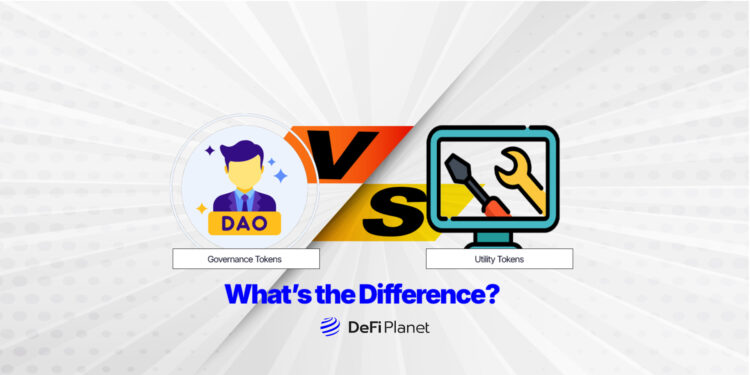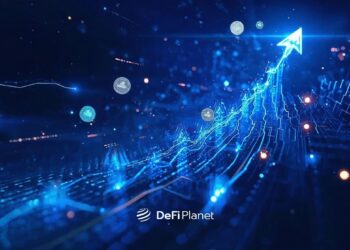Last updated on May 27th, 2025 at 01:00 pm
Tokens are the backbone of blockchain ecosystems. They form the foundation of decentralized finance (DeFi), non-fungible token (NFT) marketplaces, and other blockchain-based innovations.
Among the various types of digital assets, governance tokens and utility tokens play particularly crucial roles. Understanding the differences between governance and utility tokens is essential for investors, developers, and users navigating the blockchain space.
Recognizing how each token functions within an ecosystem can help stakeholders make informed decisions regarding investments, regulatory compliance, and participation in DeFi protocols.
What Are Governance Tokens?
Governance tokens are a unique category of cryptocurrencies that empower holders to participate in the decision-making processes of blockchain projects.
Unlike traditional digital assets, which primarily serve as stores of value or mediums of exchange, governance tokens grant voting rights, allowing users to shape the future of a decentralized protocol. By holding these tokens, network participants can propose and vote on key decisions, such as protocol upgrades, fee adjustments, and the allocation of treasury funds. This decentralized governance model enhances transparency and reduces reliance on centralized authorities.
A notable example of how governance tokens are used occurred in 2021 when Uniswap (UNI) holders voted on a proposal to allocate $25 million to Flipside Crypto. This decision showcased how governance tokens can directly impact a project’s direction and funding.
Several prominent blockchain projects utilize governance tokens to engage their communities:
- UNI (Uniswap): Allows holders to vote on protocol upgrades and liquidity mining incentives.
- AAVE (Aave): Enables token holders to influence lending parameters, including interest rates and collateral requirements.
- COMP (Compound): Grants users the ability to propose and vote on modifications to the Compound lending protocol.
What Governance Tokens Are Used For
- Decentralized Governance: Governance tokens help eliminate centralized control by distributing decision-making power across a wide network of token holders. This fosters a more democratic and transparent system, where protocol upgrades, funding allocations, and policy changes are determined by the community rather than a central authority.
- Community Engagement: By giving token holders the ability to vote on proposals, governance tokens encourage active participation in a project’s development. This engagement strengthens the ecosystem by ensuring that those who are most invested in the platform—its users and developers—have a say in its future direction. Over time, this fosters a sense of ownership and long-term commitment among community members.
- Financial Incentives: Many governance tokens offer additional financial benefits beyond voting rights. Token holders can stake their assets to earn rewards, participate in liquidity mining, or use their tokens in yield farming strategies to generate passive income. These incentives not only attract investors but also help ensure continued engagement in governance activities.
What Are Utility Tokens?
Utility tokens are a class of digital assets designed to provide access to specific services, features, or functionalities within a blockchain ecosystem.
Unlike governance tokens, which grant decision-making power, utility tokens serve a more functional role—enabling transactions, reducing fees, and unlocking platform-specific benefits. They are integral to the operation of decentralized applications (DApps), blockchain networks, and financial protocols, making them a cornerstone of the broader Web3 economy.
A prime example of a utility token is Binance Coin (BNB), which facilitates transaction fee payments on Binance, one of the world’s largest cryptocurrency exchanges. Users who pay trading fees with BNB receive discounts, reducing their overall transaction costs and increasing the token’s demand within the exchange.
Several well-known utility tokens include:
- BNB (Binance Coin): Used for transaction fee discounts and payments within the Binance ecosystem.
- LINK (Chainlink): Powers smart contract interactions by enabling access to real-world data through decentralized oracles.
- MATIC (Polygon): Enhances scalability and speeds up transactions on the Polygon network, making Ethereum-based applications more efficient.
RELATED: Why Tokenomics Are Important In Crypto Projects
What Utility Tokens Are Used For
- Broad Usage: Utility tokens are essential to the functionality of blockchain-based platforms, providing users with access to services, applications, and network operations. They enable various functions such as paying transaction fees, accessing premium features, and facilitating interactions between decentralized applications (DApps). Their adaptability makes them integral to the expansion of blockchain ecosystems, supporting decentralized finance (DeFi), gaming, supply chain management, and other industries.
- Scalability: Many utility tokens are designed to enhance the efficiency and scalability of blockchain networks. For instance, tokens like MATIC (Polygon) optimize transaction speeds and reduce congestion on the Ethereum blockchain by enabling Layer 2 scaling solutions. By offloading transactions to more efficient networks, utility tokens contribute to faster processing times and lower costs, making blockchain-based applications more accessible and practical for widespread adoption.
- Reduced Transaction Costs: One of the key benefits of utility tokens is their ability to minimize transaction expenses. Many blockchain networks and exchanges offer discounts or reduced fees to users who pay with native utility tokens. For example, Binance Coin (BNB) allows traders to receive discounted fees on Binance, while Ethereum (ETH) is required for gas fees when executing smart contracts. These cost-saving mechanisms enhance user experience and encourage long-term platform engagement.
What’s the difference between governance token and utility token?
| Feature | Governance Tokens | Utility Tokens |
| Primary Function | Decentralized decision-making | Network usage & service access |
| Ownership vs. Functionality | Ownership & voting rights | Functional use within a platform |
| Value Drivers | Community participation, project success | Demand for platform services |
| Market Behavior | Influenced by governance proposals & participation | Driven by platform adoption & network effects |
| Regulatory Implications | Potential classification as securities if used for profit-sharing | May be considered securities based on usage |
Combining or Separating Governance and Utility: Design Choices in Token Models
As crypto projects evolve, one of the most critical design decisions they face is whether to issue a single token that handles both governance and utility functions or to separate these roles into distinct tokens. This choice can significantly affect user incentives, protocol security, and long-term scalability.
Why Some Projects Combine Functions
Projects that opt for a dual-purpose token believe simplicity increases adoption. Having a single token that allows users to both access the protocol and participate in governance reduces friction. It also aligns user incentives—those who use the platform are also the ones steering its future.
AAVE and COMP are good examples. Each project uses one token (AAVE and COMP, respectively) to grant governance rights while simultaneously offering economic utility like staking or rewards. This approach encourages deep engagement from the same group of users.
Why Others Keep Tokens Separate
On the other hand, some projects deliberately separate governance from utility to avoid conflicts of interest. In these systems, utility tokens handle everyday interactions (like payments or gas), while governance tokens are distributed to long-term stakeholders, often through staking or treasury grants.
Separating functions helps projects protect governance from short-term speculation. For example, someone who simply wants to use the platform for its services shouldn’t automatically gain voting power over how it’s run. This model introduces a clearer barrier between users and decision-makers.
The First Known Case: MakerDAO’s Dual Token Model
MakerDAO was one of the earliest projects to formally separate token functions. It introduced MKR as the governance token and DAI as the utility token—a decentralized stablecoin. This model ensured that governance decisions were made by MKR holders, while DAI could be used broadly across DeFi protocols without conflating its value with governance actions.
The rationale, as stated in early whitepapers and developer blogs, was that “governance should be concentrated among participants with a long-term interest in system stability, not among transient users.” By splitting the tokens, MakerDAO created a clear accountability structure: MKR holders take on risk and responsibility for protocol health, while DAI users benefit from price stability and liquidity.
This separation has since influenced many newer projects, especially those dealing with stablecoins, lending, or modular DeFi components.
Governance vs. Utility Tokens: The Future of Digital Asset Innovation
As blockchain technology matures, the distinction between governance and utility tokens will continue to shape user behaviour, protocol design, and network sustainability. The choice of whether to combine or separate these roles is no longer just a technical preference—it’s a governance philosophy.
Some protocols believe user alignment is strongest when one token does it all. Others prefer clarity and compartmentalization. Both models have succeeded and failed in different contexts, and their effectiveness often depends on the project’s goals, maturity, and user base.
In the coming years, we may see even more experimentation:
- Projects might issue modular tokens with upgradable permissions.
- Dynamic voting systems could weight governance power based on usage, reputation, or duration of token holding.
- Regulatory developments may also push more projects toward clear token separation to avoid classification as securities.
Ultimately, governance tokens and utility tokens are two sides of the same decentralized coin. Whether fused or separate, their proper design remains key to aligning communities, incentivizing participation, and maintaining trust in blockchain ecosystems.
Disclaimer: This article is intended solely for informational purposes and should not be considered trading or investment advice. Nothing herein should be construed as financial, legal, or tax advice. Trading or investing in cryptocurrencies carries a considerable risk of financial loss. Always conduct due diligence.
If you want to read more market analyses like this one, visit DeFi Planet and follow us on Twitter, LinkedIn, Facebook, Instagram, and CoinMarketCap Community.
Take control of your crypto portfolio with MARKETS PRO, DeFi Planet’s suite of analytics tools.”





















